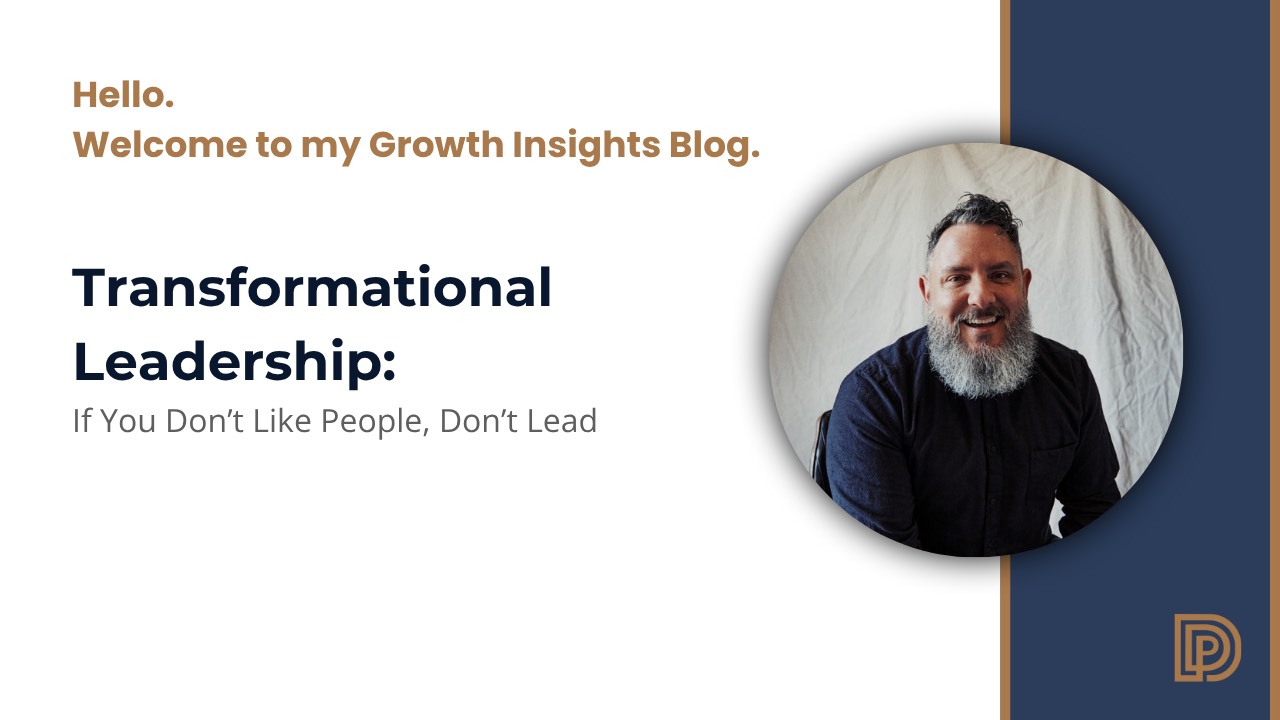If You Don’t Like People, Don’t Lead
Oct 17, 2025
Why True Leadership Begins With Genuine Care, Not Control
Leadership is often glamorized as the art of influence, strategy, and execution. But strip away the titles, metrics, and mission statements, and leadership boils down to one truth: If you don’t like people, don’t lead.
My friend and mentor, John C. Maxwell says it best: “Leadership is influence, nothing more, nothing less.” But influence only exists when people want to follow you. And people only follow leaders they believe care about them.
Leadership isn’t about being in charge. It’s about caring for those in your charge. Simon Sinek said that, and it’s one of the simplest ways to measure whether someone is truly leading or merely managing.
The real question is:
Do you like people or do you merely tolerate them on your way to the goal?
The Paradox of Leadership Success
We’ve all met the “results-driven” leader who hits every number but burns out every person. They believe leadership is about performance, not people. But here’s the paradox:
You can’t get extraordinary results from disengaged people.
According to Gallup, only 23% of employees worldwide are engaged at work. That means 77% are either passively showing up or actively disengaged. And when employees feel their leaders don’t genuinely care, engagement drops by another 45%.
When leaders focus on metrics without meaning, they create compliance instead of commitment.
Compliance gets you short-term performance. Commitment creates long-term growth.
One builds fear.
The other builds trust.
The Ultimate Competitive Advantage
In business, we obsess over understanding customers through surveys, analytics, and data. But the greatest untapped advantage often lies in understanding your team.
A leader with high emotional intelligence and behavioral awareness can unlock exponential results. DISC reveals how people behave. EQ shows how they feel. Working Genius clarifies how they think and contribute.
When you combine those insights, you stop managing tasks and start leading people.
Maxwell’s Law of Connection says: “Leaders touch a heart before they ask for a hand.”
That’s not sentimentality it’s neuroscience. Mirror neurons in the brain fire when we sense empathy and connection. The energy of a leader is literally contagious.
Culture doesn’t change through memos; it changes through modeling.
The Transformational Shift
Transactional leadership says: “Do this because I said so.”
Transformational leadership says: “Let’s do this because we believe in it.”
One uses authority; the other builds trust.
One drives compliance; the other inspires commitment.
When Satya Nadella took over as CEO of Microsoft, he shifted the culture from “know-it-all” to “learn-it-all.” His focus on empathy transformed not only the company’s culture but also its profitability. Microsoft’s market cap tripled in his first six years.
That’s the power of connection over command.
Leaders who listen, empathize, and believe in their people create what Amy Edmondson calls psychological safety: the single greatest predictor of high-performing teams (Harvard, 2019).
If You Don’t Like People, You’ll Always Limit Growth
It’s impossible to fake genuine care.
People can feel your intentions before they hear your instructions.
If you secretly resent people, if you see them as obstacles, interruptions, or “resources” your leadership energy will always betray you. And your culture will mirror it.
Because culture is the shadow of leadership.
When people feel unseen, unheard, or undervalued, creativity shuts down. Trust erodes. Innovation disappears. And the organization starts to stagnate not because of the market, but because of mindset.
Every problem in business is ultimately a people problem.
Every solution in business is ultimately a leadership solution.
Transformational Leaders Grow People, Not Just Performance
Liking people doesn’t mean being soft.
It means being invested in their growth, well-being, and success.
Herb Kelleher, founder of Southwest Airlines, famously said:
“If you treat your employees like they make a difference, they will.”
He proved that a people-first culture can drive both profit and loyalty. While other airlines cut costs through layoffs, Southwest built community and culture and became one of the most profitable airlines in history.
Transformational leaders hold people to high standards because they care, not because they control.
They ask tough questions because they believe in potential, not because they seek perfection.
The best leaders aren’t just focused on who their team is, they’re focused on who their team can become.
Reflection Questions for Growth-Minded Leaders
-
Do I genuinely enjoy developing people or just achieving goals?
-
When was the last time I made a team member feel truly seen and valued?
-
Do I know what motivates each person on my team at their core?
-
Would my team describe me as approachable, caring, and consistent?
-
How am I growing myself as a leader to better serve others?
Action Steps: Leading with People at the Center
-
Listen to understand, not respond. Slow down. Be present.
-
Use behavioral insights. Know how each person thinks, feels, and works best.
-
Recognize and celebrate progress. People repeat what’s rewarded.
-
Lead by example. Your tone sets the temperature.
-
Coach, don’t command. Ask questions that pull potential forward.
Leadership is less about having followers and more about creating leaders.
If you don’t like people, don’t lead.
Because leadership is a sacred responsibility. One that requires patience, empathy, and belief.
But if you do like people…
If you care about their potential, their progress, and their purpose, then lead with everything you have.
That’s transformational leadership.
That’s what changes lives, teams, and organizations.
If you’re ready to elevate your leadership, growing yourself, your team, and your business through people-centered strategy, explore The Pippin Method™ Leadership Pillar or schedule a discovery session. Let’s help you lead with clarity, confidence, and connection.
